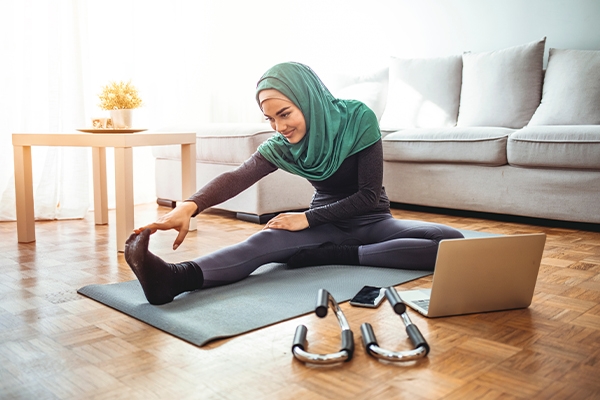Maintain Your Fitness During Fasting

Getting regular exercise is essential to living a healthy lifestyle. In addition to strengthening muscles and bones, this physical activity helps lower the risk of diabetes and heart disease and helps maintain a healthy body weight.
Exercising while fasting can be challenging, but it is not impossible. In fact, with careful planning and preparation, you can still do it safely and consistently for thirty days.
Thirty minutes per day may be enough when you are also fasting.
The key is not to push yourself too hard. Focus on three things: maintaining your fitness, creating sustainable (and safe) exercise routines, and focusing on nutrient-rich foods and water.
Make slights adjustments to your exercise
If your goal is to lose weight and get fit, focus on high-intensity cardio exercises. These kinds of exercises burn more calories than low-intensity exercises like walking or jogging.
Here are tips to help you stay on track with your exercise:
1. Choose the right time to do it

Exercising while fasting can be challenging, especially in the hot sun. Make sure you have the energy to do it, and can replenish it immediately after exercising. The best time to exercise is before breaking your fast. Why? Because you can eat and drink right away afterwards. This allows your body to recover and hydrate more quickly.
Don't forget to wear comfortable and loose clothing made from materials that can absorb sweat well. Wear a hat to protect yourself from direct sunlight.
2. Keep up the good work

Now is not the time to achieve your best, but to maintain what you've achieved. Remember that the goal of exercise is to maintain fitness. Overexercising has negative effects such as low blood sugar, chronic fatigue, headaches, dehydration, and emotional stress.
To avoid these problems, pay attention to your body and take breaks as necessary. Rest days are crucial for muscle repair and overall recovery. For more effective exercise goals, it is recommended to rest 1-2 days per week.
Don't feel guilty if you take a break -- this is an important part of maintaining a healthy and sustainable exercise routine.
3. Stay hidrated between breaking the fast and pre-dawn meal (sahur)

The key to exercising while fasting is to ensure that your body stays well-hydrated. Dehydration can make exercise difficult and accelerate fatigue. Staying hydrated is one of the best ways to exercise safely and effectively while fasting.
How do I do it?
- Drink at least 2 liters or 8 glasses of water. You can apply the 2-4-2 while fasting. Two glasses at breaking fast; four glasses at night; two glasses at a pre-dawn meal (sahur).
- Before breaking the fast is the ideal time to work out. This enables your body to replenish fluids after working out.
- Add beverages such as juice or low-sugar milk when breaking the fast to aid in energy recovery.
- Consume fruits with high water content, such as oranges, for natural energy and hydration.
- Vegetables like cucumbers can be a good choice because they have a high water content.
4. Recognize the signs of dehydration

If you have followed the tips above but still experience the following symptoms, stop exercising.
- Dizziness
- Fatigue
- Mild headache
- Dark-colored urine
- Feeling very thirsty
- Nausea
- Muscle cramps
- Rapid heartbeat
5. Choose the right foods after exercising

Consuming the right foods after or before exercising can help maintain and restore body performance. Of course, this needs to be adjusted to the type of exercise, intensity, and duration.
Foods high in carbohydrates, fat, and protein are good to consume two hours before exercise. These types of food will provide energy, as well as support muscle repair and recovery well, help regulate metabolism and provide essential nutrients for the body. Some examples of high-protein foods include peanut butter, oatmeal, eggs, and grilled chicken.
Benefits of exercising while fasting
If you are trying to lose weight while fasting, exercising during fasting helps burn calories from the food you consume. Not from stored fat.
Here are some other benefits of exercising while fasting:
1. Lose weight faster
Cardio or weight training while fasting can increase fat burning quickly. Fasting can help deplete glycogen stores, leaving your body with no choice but to burn fat.
2. Look fitter and healthier
Exercise makes your body feel healthier. Research has shown that exercise increases blood flow to the brain which can improve concentration, and mood, and give you better energy throughout the day. Exercise also helps maintain overall physical and mental health.
3. Boosting autophagy
Autophagy is the process of removing damaged cells and recycling their components. This process occurs when we exercise. Autophagy also helps reduce the risk of oxidative stress and supports cell health.
Stay motivated and don't give up. Exercise during fasting can provide many benefits for your physical and mental health. When exercising while fasting, always be mindful of your body's needs and use caution.



